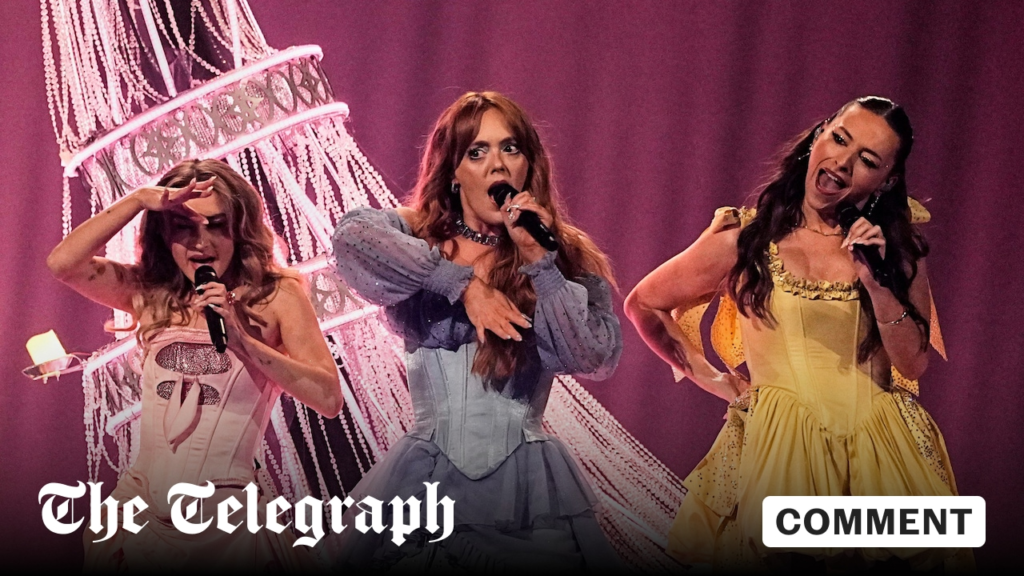The pop contest was as bombastic as ever. But let’s not pretend it’s good music, or that Britain will ever be able to succeed
Copy link
twitter
facebook
whatsapp
email
Copy link
twitter
facebook
whatsapp
email
Copy link
twitter
facebook
whatsapp
email
Copy link
twitter
facebook
whatsapp
email
Austria won the Eurovision, with 24-year-old JJ delivering his cinematically epic ditty Wasted Love. It is a peculiar kind of song, of a type that really only exists in the context of this ridiculous contest: a pop-operatic techno-electro ballad.
It offers a technically impressive, histrionically emotional style of performance that suits the over emphatic, super colourful, gaudily camp nature of the Eurovision’s televisual musical competition. It works in the moment it is present before you, which is all that television demands.
I am not suggesting it is music without worth, only that there is no other space in which a piece of music like this could become a hit. It bears no relation to pop music as it exists in the world, with no groove to dance to, no earworm hooks, no singalong melody and nothing really to recommend it but the extraordinary, ethereal, emotionally expressive, technically impressive and almost inhumanly high singing of its young vocalist.
It is a flamboyant style that hits very hard in the moment of its delivery and certainly suits the gladiatorial aspect of a contest. How many humans can even deliver notes like this? It’s also genuinely lovely, and will deservedly deliver JJ a form of stardom, albeit not one replete with further hit singles. Because it’s essentially a novelty record, which is all that we have come to expect from a novelty song competition.
Let’s be honest, how many pop-operatic songs do you hear as you go about your day to day business? It is not a style of music that generally impacts the world, but it is certainly a style that does well at Eurovision. Indeed, it is not dissimilar to last year’s winner by Swiss artist Nemo, and JJ was coached by Austria’s 2014 winner Conchita Wurst.
Maybe next year Britain needs to send an opera singer instead of some cabaret pop wannabes. Or do a full Brexit, and don’t send anybody at all.
This great pop nation once again got the dreaded “nul points” from the public vote at the Eurovision. Nul. Nada. Nothing. Harmonising girl trio Remember Monday were actually doing OK on the jury vote. No one expected them to win, but their technically superb harmonic singing, bright smiles and 70s pastiche pop had clearly won some admirers amongst the professionals. But when it came to the public phoning in, nobody in Europe gave a toss. We may be the most historically significant musical country in Europe, with the biggest share of the global music market of any European country, but we are not in the running at the Eurovision. Nobody loves us, and we can’t seem to figure out why.
But maybe it is just that the Eurovision has become a world unto itself, sealed off from the rest of popular culture, a camp and over-stressed absurdist magnification of particularly gaudy pop genres with everything dialled up to the max. It is certainly not a song contest, so what is the point of sending anything resembling a proper pop song? You could send Adele and Ed Sheeran to duet on a ballad written by Elton John and Kate Bush and it would probably come home empty handed. I know I am a music critic, and this is a TV show, but I honestly don’t think I heard a single song that I would rate as genuinely special in that whole giddily entertaining farrago of an entertainment spectacular.
We’ve had the Eurovision for 69 years now and it has delivered precisely one major universally beloved gold standard pop winner: ABBA. That’s not a fantastic hit rate. And that’s because it is not really a music show, it’s a comedy gladiatorial contest, with a bit of music on top.
Interestingly, none of the bookies’ favourites did particularly well either, so they are obviously as lost when it comes to the Eurovision as me. All the camp sex saucy techno sex songs with the great odds floundered. Which has to be a good thing. It’s a wild idea, but maybe it’s time to stop sending comedy acts to a song contest. But then, who do you send? Who really wants a part of this silliness?
In the end, it turned into a battle between an over-the-top pop-operatic ballad from Austria and a straight up mushily sentimental orchestral ballad from Israel. I am sure that the Eurovision organisers were utterly relieved that Austria carried the day with a final surge from the public vote, snatching victory from Israel (who typically benefit from a highly loyal public vote). There was nothing wrong with the simple and emotional Israeli song, but the prospect of staging the competition in Tel Aviv next year, with all the embargoes and drop outs that would inevitably ensue, might have finished this ridiculous concept off once and for all.
But then, would that really be such a bad thing? It is entertaining, in its own silly way, but if it is not going to deliver big stars singing memorable songs good enough to become part of the musical fabric of our times, what is the Eurovision Song Contest actually for?
Copy link
twitter
facebook
whatsapp
email
5/5
The moral of Eurovision 2025? Time to consider a musical Brexit – The Telegraph
